A Werewolf Boy (2012); Korean with English subtitles
Park Bo-young, Song Joong-ki. Written and directed by Jo Sung-hee.
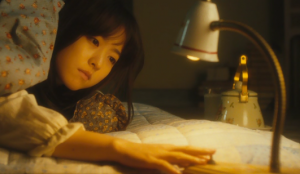 I recently heard a prominent sports columnist admit that he never felt more guilt than when, after harshly scolding his old dog for disobedience, he realized the reason for the noncompliance was that his dog had gone deaf.
I recently heard a prominent sports columnist admit that he never felt more guilt than when, after harshly scolding his old dog for disobedience, he realized the reason for the noncompliance was that his dog had gone deaf.
If the depth of this writer’s guilt is unfathomable to you, I’m willing to bet that you will find A Werewolf Boy to be a puzzling, if not comically absurd, experience. But if you have ever experienced the unique connection a human can have with his or her dog, you will discover here a stirring love story of a different kind, one that strives to express the specialness of such a bond.
It is a tough, uphill task that director-writer Jo Sung-hee sets for himself when he introduces Suni (Park Bo-young), an ailing teenaged girl with no friends, to Cheol-su (Song Joong-ki), a feral wolf-boy who doesn’t speak and has apparently never bathed. If he underhumanizes Cheol-su, he doesn’t have much more than a girl-meets-dog story, and the falling in love doesn’t work (or it gets really creepy); if he humanizes him too much, the love story is just another love story, something the director clearly wants his film to rise above. This is not merely the flawed love of all our favorite movies, but something realer and more profound than our fairy tales.
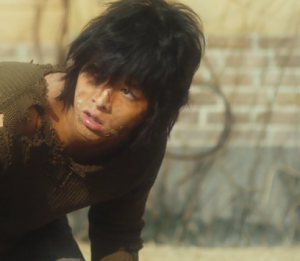 He mostly accomplishes this task, ‘though there are a few missteps. In presenting Cheol-su as a wild child, too many bizarre questions come to mind that are never even pondered by the film or its characters. For example, why does this teenaged wolf-boy with no human nurturing not have very long hair, and why is he clean-shaven? And what reasons would he have for developing the crazy, cartoon-like ferocious eating style he exhibits? Dogs and wolves just don’t eat the way he eats, and humans, even humans raised as animals, would have no reason to tear into a potato like Cookie Monster into a snickerdoodle.
He mostly accomplishes this task, ‘though there are a few missteps. In presenting Cheol-su as a wild child, too many bizarre questions come to mind that are never even pondered by the film or its characters. For example, why does this teenaged wolf-boy with no human nurturing not have very long hair, and why is he clean-shaven? And what reasons would he have for developing the crazy, cartoon-like ferocious eating style he exhibits? Dogs and wolves just don’t eat the way he eats, and humans, even humans raised as animals, would have no reason to tear into a potato like Cookie Monster into a snickerdoodle.
These odd questions aren’t easy to push from one’s mind, even considering the mostly open willingness with which Suni and her family accept Cheol-su into their home. There is a convincing settling-in, thanks in large part to the neighborhood kids who welcome Cheol-su as a playmate and to Suni’s mother, whose no-nonsense approach to embracing this wolf-boy seems to come from seeing him first as a boy with no parents. But adoption is one thing. Falling in love is something else.
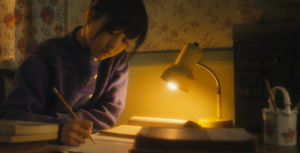 Park Bo-young is remarkably pretty, even for an actress in a Korean film, and the director enjoys framing her in visually appealing shots in front of a variety of scenes. Despite a few moments of overacting, she feels real, both as the mopey sick girl who writes poetry by moonlight and as an emerging friend for Cheol-su. In one dramatic scene near the end, Suni displays a deep anguish that can be tough for an actress to sell, but Park earns it with an earnest, thoughtful performance in the rest of the film.
Park Bo-young is remarkably pretty, even for an actress in a Korean film, and the director enjoys framing her in visually appealing shots in front of a variety of scenes. Despite a few moments of overacting, she feels real, both as the mopey sick girl who writes poetry by moonlight and as an emerging friend for Cheol-su. In one dramatic scene near the end, Suni displays a deep anguish that can be tough for an actress to sell, but Park earns it with an earnest, thoughtful performance in the rest of the film.
I’m not as enamored of Song’s performance as Cheol-su, mostly because the absurdity of his character is just too much to overcome. Forced to do almost all of his acting through facial expressions and bodily movement, Song is helped, but just not enough, by Park’s believability. The blame is largely on bad decision-making by the film’s writer: I’m not sure the actor who can sell Cheol-su has yet been born.
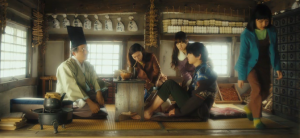 Supporting actors, and the characters they play, are right out of Hollywood conventions: an overweight military officer, an intellectual but sympathetic professor, a jealous jerk who wants to be the main character’s boyfriend. A film that must convince you that a girl can fall in love with a wolf-boy has got to do better with secondary characters than this. Every character outside Suni’s home reminds you of two or three characters you’ve seen in other films, and it doesn’t have to be that way.
Supporting actors, and the characters they play, are right out of Hollywood conventions: an overweight military officer, an intellectual but sympathetic professor, a jealous jerk who wants to be the main character’s boyfriend. A film that must convince you that a girl can fall in love with a wolf-boy has got to do better with secondary characters than this. Every character outside Suni’s home reminds you of two or three characters you’ve seen in other films, and it doesn’t have to be that way.
The visuals are impressive, almost self-consciously so. There are angles that make you think of Pulp Fiction; there are vistas that make you think of The Karate Kid. There is a long, slow cross-fade, and edits that make you think the director is auditioning for film school. It would be a bit too much if it didn’t somehow contribute, but most of it does.
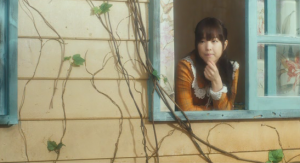 I was on the fence with A Werewolf Boy until the very, very end of the movie. The last couple of scenes had me teetering in the film’s favor, and then the final scene, over which the closing credits scroll, pushed me over. It is a better film with that last scene, so do yourself a favor and stick around at least until the credits are scrolling over black.
I was on the fence with A Werewolf Boy until the very, very end of the movie. The last couple of scenes had me teetering in the film’s favor, and then the final scene, over which the closing credits scroll, pushed me over. It is a better film with that last scene, so do yourself a favor and stick around at least until the credits are scrolling over black.
Most thoughtful teens I know will find A Werewolf Boy, which has been a record-breaking success at Korean box offices, a very affective experience, ‘though they may need some help unpacking the movie’s end. Whether others will like it depends on how strong the impulse is within them to pet a friendly dog. It works for me.
7/10, which means I like it with some reservations.
A Werewolf Boy opened November 30:
Los Angeles, CA – CGV Cinemas
Irvine, CA – University Town Center
Fullerton, CA – Regal La Habra
Las Vegas – Regal Village Square 18Opens December 7:
San Diego, CA – AMC Fashion Valley
San Francisco, CA – Century 20 Daly City
Seattle – AMC Alderwood
Dallas – AMC Grapevine Mills
Chicago – AMC Showplace Niles
Atlanta – AMC Colonial
Philadelphia – AMC Plymouth Meeting
New Jersey – AMC Ridgefield Park
New York – AMC Empire
New York – Cinemart Cinemas 5
Honolulu – Consolidated Pearlridge
Vancouver – Cineplex Silvercity Coquitlam
Toronto – Cineplex Odeon Yonge & Dundas
Toronto – Cineplex Odeon Sheppard








